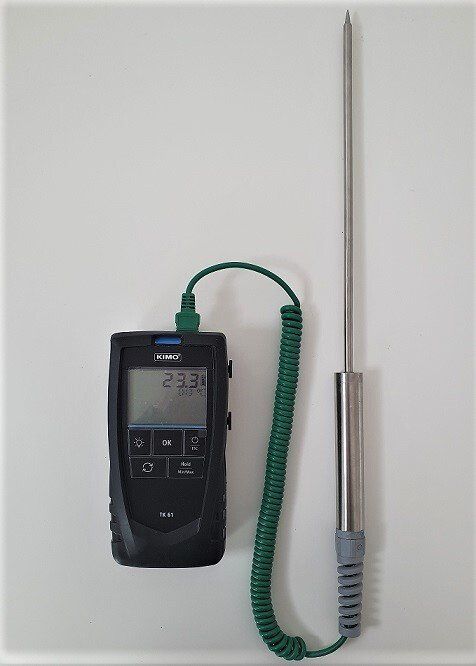Heavy Duty TR61 Thermometer & Robust Insertion Probe
Complete with FREE Calibration certificate, traceable to National Standards.
In industries where precise temperature measurement is critical—such as food safety, pharmaceuticals, HVAC, and manufacturing—regular temperature calibration of instruments is essential. One of the most reliable tools for this task is a dry block temperature calibrator. But what exactly is a dry block calibrator, and why is it so important?
A dry block temperature calibrator is a specialized instrument used to calibrate portable thermometers and temperature probes. It acts as a stable temperature source, providing a controlled environment that simulates a wide range of temperatures needed for calibration.
The core component of a dry block calibrator is a temperature-controlled metal block. This block can be precisely heated or cooled to reach specific temperatures. By inserting the thermometer or probe into the block, calibration professionals can compare the instrument’s reading against a trusted reference standard, verifying or adjusting accuracy as required.
Unlike liquid bath calibrators, which use a liquid medium to transfer heat, dry block calibrators rely on metal blocks with drilled wells designed to accommodate various probe sizes and diameters. These blocks rapidly heat or cool, providing consistent and stable temperatures without the mess or maintenance associated with liquids.
Calibration technicians place the instrument under test into the block, alongside a precision reference thermometer for accuracy comparison. This setup ensures reliable calibration results, helping maintain compliance with regulatory standards such as HACCP, ISO 9001, and HSE requirements.
Accurate temperature measurements are crucial for product quality, safety, and compliance. Whether you're calibrating food thermometers, HVAC sensors, or industrial temperature probes, regular calibration helps:
The TE-25NL Dry Block Calibrator: A Portable Calibration Solution
An excellent example of a dry block temperature calibrator is the TE-25NL by Presys. This portable unit is ideal for in-house or on-site calibration, combining ease of use, rapid temperature stability, and a wide temperature range including negative temperatures.
With the TE-25NL, users gain a versatile, robust calibrator capable of handling various probes and thermometers, ensuring your instruments deliver precise and trustworthy readings every time.
A dry block temperature calibrator is an indispensable tool for maintaining the accuracy of temperature measurement devices. Whether used in food service, healthcare, manufacturing, or HVAC, regular calibration with dry block calibrators ensures compliance, safety, and confidence in your temperature readings.
If you need a reliable, portable calibrator like the TE-25NL for your business, Techris Systems offers expert advice and nationwide support in Ireland. Contact us today to learn how we can help you keep your temperature instruments perfectly calibrated.
Ready to ensure your temperature instruments are accurate and compliant? Contact Techris Systems today for expert advice and supply of portable dry block temperature calibrators like the TE-25NL. Keep your calibration process fast, reliable, and hassle-free with Ireland’s trusted calibration partner.

Heavy Duty TR61 Thermometer & Robust Insertion Probe
Complete with FREE Calibration certificate, traceable to National Standards.
Gorteens, Castleblayney, Co. Monaghan, Ireland